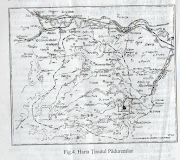On March 9, the Christians celebrate the Forty Martyrs of Sevaste, killed for their faith, after refusing to worship the idols. Therefore, they were taken bound to a lake in winter and were left to freeze in the middle of the water. In the popular calendar, March 9 is also Martyrs 'Day or Martyrs' Day, the Christian holiday overlapping the beginning of the Agrarian Year, celebrated on the border between winter and summer, leaving behind the cold days of Dochia and making room for the warm days of "Mosi". In the popular belief, this day ends the days of Baba Dochia, who symbolizes the old year, her death, on March 9, marking the boundary between the cold and the warm season. Thus, the customs practiced on the occasion of this holiday also include elements specific to the New Year's ritual.
In all the ethnographic areas of Romania, the tradition is kept to prepare specific bakes from March 9, which are called Saints, and, most often, Martyrs, in memory of the 40 martyrs from Sevaste. Also, according to popular tradition, another custom is to consume 40 or 44 glasses of wine. It is said that on the Day of the Martyrs the tombs and gates of Heaven are opened, so that the souls of the dead may return among the living, who are expected with chairs and tables spread at the fires of the Martyrs. In order to mark the beginning of the new agricultural year, on this day the plow was plowed in a festive way, a moment that also opened the cycle of spring holidays.
The last of the "Old Ladies Days" coincides with another tradition called, locally, in Ținutul Pădurenilor, "Sâmţii". Here, in the old times, this holiday's purpose was to defend the household against venomous snakes, which might have nested near the house. The ritual consisted of gathering rags in the yard where embers were placed over them to smoke. The smoking debris was shovelled around the house, the stable, the pantry, the kitchen, the shed, and all the walls so that the snakes in the field would not come near the house. The holiday has other meanings. Children are given to eat honey; the jar of honey is placed on the hearth of the house, and the children sit around it while they eat honey. In the same way, the bees have to settle in the summer, when they are swarming.
The ritual of expelling snakes did not take into account the house snake, which enjoyed a special status, being protected and even fed by the housewife.
On the "Sâmții" day, women made 40 "pupi" (pastries) of unleavened husk, as many holy martyrs were honored on this day, "so that none of them would be upset if they were left without a "pup". On this day, we encounter practices of pre-Christian and Christian origin, somehow detached from each other, the share being held first, proof that the Christian feast of the 40 holy martyrs was assimilated in a late period.
Thank you of your interest in finding new information and traditions about our wonderful land, Ținutul Pădurenilor, and also about our beautiful country of Romania.
English version by Norana Adina
Ținutul Pădurenilor - România
























0 Comments